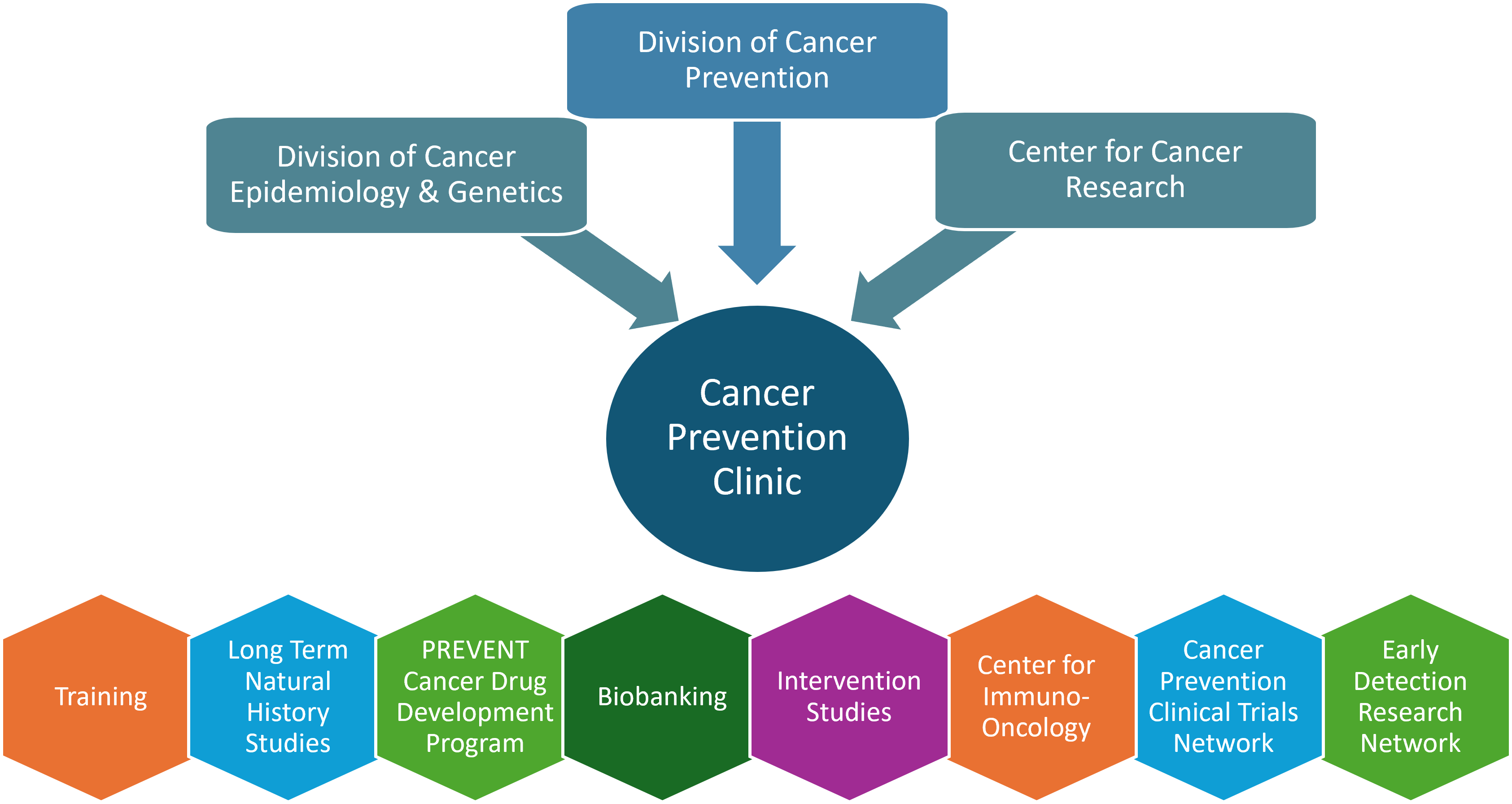Learn more about taking part in or partnering with us to enroll a patient in an NCI Cancer Prevention Clinic study. Explore whether one of our trials may be right for you, a patient, or a loved one.
NCI Cancer Prevention Clinic
Addressing next-generation approaches to clinical management of high-risk individuals and testing of cancer prevention interventions
NCI Cancer Prevention Clinic
About
The NCI Cancer Prevention Clinic (CPC) conducts research in cancer prevention, early detection and screening for groups at high risk of cancer. Housed in the NCI Center for Cancer Research, the clinic combines expertise from the Division of Cancer Prevention (DCP) with that of intramural investigators from the Center for Cancer Research (CCR) and the Division of Cancer Epidemiology and Genetics (DCEG).
The CPC reflects the importance of prevention in ending cancer as we know it. This clinical program supports the evaluation and exploration of primary and secondary cancer prevention through the development of novel agents and the repurposing of therapeutic agents for prevention. Next-generation approaches will be used for early cancer diagnosis and for enhanced management of individuals with a family history of cancer or known cancer-causing mutations.

Patients & Providers
Have questions or need help finding a trial?
Email CPC@nih.gov
Clinical Trials
Low Dose Apalutamide Pre-Prostatectomy
This phase IIa trial investigates the biomarker (plasma levels of PSA) of low-dose apalutamide in patients with prostate cancer confined in the prostate gland before surgery. Testosterone can cause the growth of prostate cancer cells, and apalutamide blocks the use of testosterone by the tumor cells. Giving low-dose apalutamide before prostate surgery may lead to lowered PSA levels in men with prostate cancer confined to the prostate gland.
- Principal Investigator: Peter A. Pinto, M.D.
- Referral Contact: Jill Harper, 240.858.7373
- Status: Closed to accrual
Abemaciclib in NF1 Atypical Neurofibroma
Neurofibromatosis type 1 (NF1) is a genetic disease that causes tumors called atypical neurofibromas. These tumors, which arise from nerves, can cause serious medical problems. The only treatment is surgery. Researchers want to see if a drug called abemaciclib can help.
- Principal Investigator: Andrea M. Gross, M.D.
- Referral Contact: Amanda Carbonell, 240.760.6191
- Status: Open - Recruiting
Natural History Study of MTC and MEN2
Medullary thyroid cancer (MTC) is a rare cancer of the thyroid gland. In children and adults, it is often part of a condition called Multiple Endocrine Neoplasia 2 (MEN2). MEN2 is usually caused by a genetic mutation, and it can cause a number of problems in addition to MTC. Not much is known about how MTC develops over time, especially in people with MEN2. Researchers want to study MTC in children and adults and see how it affects their growth and development.
Natural History Study of Children and Adults With Medullary Thyroid Cancer
- Principal Investigator: John W. Glod, M.D., Ph.D.
- Referral Contact: Anne Goodwin, 240.760.6195
- Status: Open - Recruiting
Natural History Study of Rare Solid Tumors
Approximately 150 cases of cancer per one million per year are considered rare cancers. While all tumors originate from genetic changes, a small percentage of these tumors are familial. Researchers want to study these changes in biological samples from people with rare tumors in order to learn more about how these tumors develop. The information obtained from this study may lead to improved screening, preventive guidelines, and treatments.
Natural History and Biospecimen Acquisition for Children and Adults With Rare Solid Tumors
- Principal Investigator: Mary Frances Wedekind Malone, D.O.
- Referral Contact: Barbara Thomas, 240.858.3633
- Status: Open - Recruiting
Cancer in Inherited Bone Marrow Failure
This is a natural history study involving questionnaires, clinical and research evaluations, clinical and research laboratory tests, review of medical records, cancer surveillance. A prospective cohort of Inherited Bone Marrow Failure Syndrome (IBMFS) will provide new information regarding cancer rates and types in these disorders. Pathogenic variant(s) in IBMFS genes are relevant to carcinogenesis in sporadic cancers. This study will determine whether patients with IBMFS who develop cancer differ in their genetic and/or environmental features from patients with IBMFS who do not develop cancer. These cancer-prone families are well suited for cancer screening and prevention trials targeting those at increased genetic risk of cancer. Carriers of IBMFS gene pathogenic variant(s) are at increased risk of cancer. The prototype disorder is Fanconi Anemia (FA); other IBMFS will also be studied.
Cancer in Inherited Bone Marrow Failure Syndromes
- Principal Investigator: Neelam Giri, M.D., M.B.B.S
- Referral Contact: NCI Family Study Referrals, 800.518.8474
- Status: Open - Recruiting
Clinical, Genetic, Epidemiologic Studies of RASopathies
The RASopathies are a clinically defined group of disorders caused by pathogenic germline variants in genes encoding components of the Ras/mitogen-activated-protein kinase (Ras/MAPK) pathway. These disorders have overlapping clinical features due to Ras/MAPK dysfunction, including a predisposition to the development of certain malignancies. The aims of this prospective longitudinal cohort study are to determine the incidence of malignancy in patients with RASopathies and determine the underlying differences in those who develop tumors as compared to those who do not, in order to inform cancer screening recommendations. In addition, this longitudinal cohort study will provide a better understanding of non-tumor RASopathy manifestations.
Clinical, Genetic, and Epidemiologic Study of Children and Adults With RASopathies
- Principal Investigator: Douglas Stewart, M.D.
- Referral Contact: NCI Family Study Referrals, 800.518.8474
- Status: Open - Recruiting
Squamous Cell Carcinoma in Fanconi Anemia
This is a natural history study involving questionnaires, clinical and research evaluations, clinical and research laboratory tests, review of medical records, and cancer surveillance. A prospective cohort of individuals with Fanconi anemia (FA) at very high risk of squamous cell carcinoma (SCC) will be screened and provide new information on oral potentially malignant lesion (OPML) development and robustly quantify the risk of progression of OPML to cancer in FA.
Defining the Natural History of Squamous Cell Carcinoma in Fanconi Anemia
- Principal Investigator: Neelam Giri, M.D., M.B.B.S
- Referral Contact: NCI Family Study Referrals, 800.518.8474
- Status: Open - Recruiting
Clinical, Epidemiologic, Genetic Li-Fraumeni Syndrome
This is a natural history study involving questionnaires, clinical and research evaluations, clinical and research laboratory tests, review of medical records, and cancer surveillance. This is a prospective long-term study of individuals at high risk of cancer due to Li-Fraumeni Syndrome (LFS) or Li-Fraumeni-Like Syndrome (LFL), using a cohort approach. Enrollees are invited to participate in all aspects of the study but can choose to opt out of specific part(s).
Clinical, Epidemiologic, and Genetic Studies of Li-Fraumeni Syndrome
- Principal Investigator: Payal Khincha, M.B.B.S., M.S.H.S.
- Referral Contact: NCI Family Study Referrals, 800.518.8474
- Status: Open - Recruiting
Clinical, Laboratory, and Epidemiologic Characterization of Individuals and Families at High Risk of Melanoma
Melanoma-prone families and individuals with risk factors for melanoma, including people with Spitzoid tumors and giant congenital nevi, are human models of susceptibility to neoplasia from which mechanisms of cancer susceptibility may be elucidated. For most of the high-risk cancer susceptibility genes, including CDKN2A and CDK4 in melanoma-prone families, germline mutations conferring risk have been found through family studies. Investigations of individuals and families at high risk of melanoma have led to etiologic clues that are important in the general population and have identified persons most likely to benefit from chemoprevention trials and screening programs aimed at early diagnosis of melanoma.
- Principal Investigator: Michael Sargen, M.D.
- Referral Contact: NCI Family Study Referrals, 800.518.8474
- Status: Open - Recruiting
Team
Steering Committee Co-Chairs
Co-Directors
Key Staff
Training
NCI Cancer Prevention Fellowship Program
The NCI Cancer Prevention Fellowship Program (CPFP) is a multidisciplinary postdoctoral program that trains future leaders in the field of cancer prevention and control. Founded in 1987, the NCI CPFP provides its fellows an opportunity to develop an independent research program in cancer prevention while being mentored by the world-class researchers and clinicians at NCI. Learn more.
NIH Hematology Oncology Fellowship Program

Training the next generation of clinicians and physician-scientists
The mission of the National Institutes of Health (NIH) Hematology Oncology Fellowship is to use the unique clinical and basic research resources of the NIH to advance the diagnosis, treatment, and prevention of hematologic and oncologic diseases by developing and training the next generation of clinicians and physician scientists. This program is jointly sponsored by the National Cancer Institute and National Heart, Lung, and Blood Institute. Learn more.






